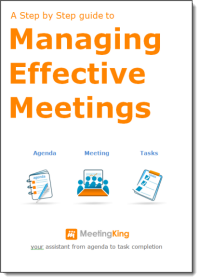Effective meetings help to move an organization or a project forward. Effective meetings leave the participants energized and create a positive morale in an organization. Unfortunately many meetings are poorly managed and according to research by salary.com 47% of the people consider meetings the #1 time waster. Having a bad meeting is worse than having no meeting at all, because a poorly managed meeting will hurt morale and make people indifferent about their jobs.
So how can you make your meeting successful and effective? Having a good meeting is really not hard, it just requires a little discipline. Two factors will determine the success of your meeting:
- meeting preparation
- meeting follow-up
As you see it focuses on the activities before and after the meeting. If the preparation and follow-up are managed properly, the meeting itself will be effective and successful.
Meeting preparation
Sometimes we have meetings, because we are supposed to have one…., but do you? Before you send out those invitations, determine the goal of your meeting. By having a clear goal for the meeting you can determine:
- Who should participate
- If it should be an in person meeting or if you can do it over the phone or with a webconferencing service
Next your prepare an agenda and collect any supporting materials. Make sure to distribute the agenda two days before the meeting. The meeting agenda is extremely important for the success of your meeting. Having a meeting without an agenda is like going to an exam without studying; you will fail, it is a waste of time.
When you set the agenda make sure that the topics are related and that they affect all participants. If you have different unrelated agenda items, it may be better to organize multiple shorter meetings with different participants, so you are not wasting anybody’s time and will have a more focused discussion.
As organizer you should make very clear that you require that all the participants are well prepared for the discussion.
Read more on how to create a meeting agenda
The actual meeting – stay focused and on time
I mentioned above that if the meeting is properly prepared the meeting will automatically be effective and successful. While this is true, making your meeting productive requires also discipline. Discipline from the organizer, as well as the participants.
- Everyone should come prepared
- Respect everyone’s time; start one time and end on time
- Follow the agenda
- Don’t discuss issues that are not on the agenda, place new unrelated topics in the Parking Lot (/importance-of-parking-lot-for-meetings/)
- Make notes and assign tasks. It is often better to write short notes, with only keypoints and decisions. Refrain from writing long detailed essays, noone will read them!
- Summarize decisions and tasks
If your meeting is related to a previous meeting, make sure you check on the status of the tasks from that previous meeting. This makes sure that things will not fall through the cracks, and seeing what was done since the last meeting, will create a sense of accomplishment. Your team will feel good and successful, a great start of the meeting!
Follow-up – meeting minutes
Your meeting is not “done” at the end of the discussion. You have to follow-up, if you don’t, your meeting was a waste of time. To make your meeting effective, immediately write your meeting minutes and distribute the minutes within 24 hours of the end of the meeting. This way participants still know the details of the meeting and any misinterpretations can be corrected. The meeting minutes should be written by one person. If you don’t have a dedicated secretary, you can take turns from meeting to meeting.
Make sure you properly file the minutes and that you can easily find information from your past discussions. How often does it happen to you that you know you discussed something 6 months ago, but are not exactly sure anymore what was decided. A powerful searchable archive is important, so you don’t need to discuss things twice.
Read more on how to write meeting minutes
Follow-up – meeting tasks
A good meeting results in tasks. However if you do not keep track of those tasks……… your wasted your time. Often people write down their own tasks, but nobody keeps track of all tasks and their due dates. To have an effective meeting you need to close the loop and see if the agreed upon tasks where actually completed.
Read more on managing meeting tasks
How MeetingKing can help
Our mission is to help the world get rid of bad meetings. We hope this information helps to you to run your meetings more effectively. The challenge is that if you try to properly prepare an agenda, write the minutes and manage your tasks with 3 or 4 different tools (email, Word, a task manager, etc.), it takes so much time, that in most cases we skip the preparation and follow-up. This is where MeetingKing comes to the rescue!
To help you have more effective meetings, we have developed MeetingKing. MeetingKing automates the entire meeting workflow from preparing the agenda to writing the minutes and managing all your tasks.
Additional information for on how to run effective meetings
Checklist for effective meetings
Download our free guide to effective meetings


